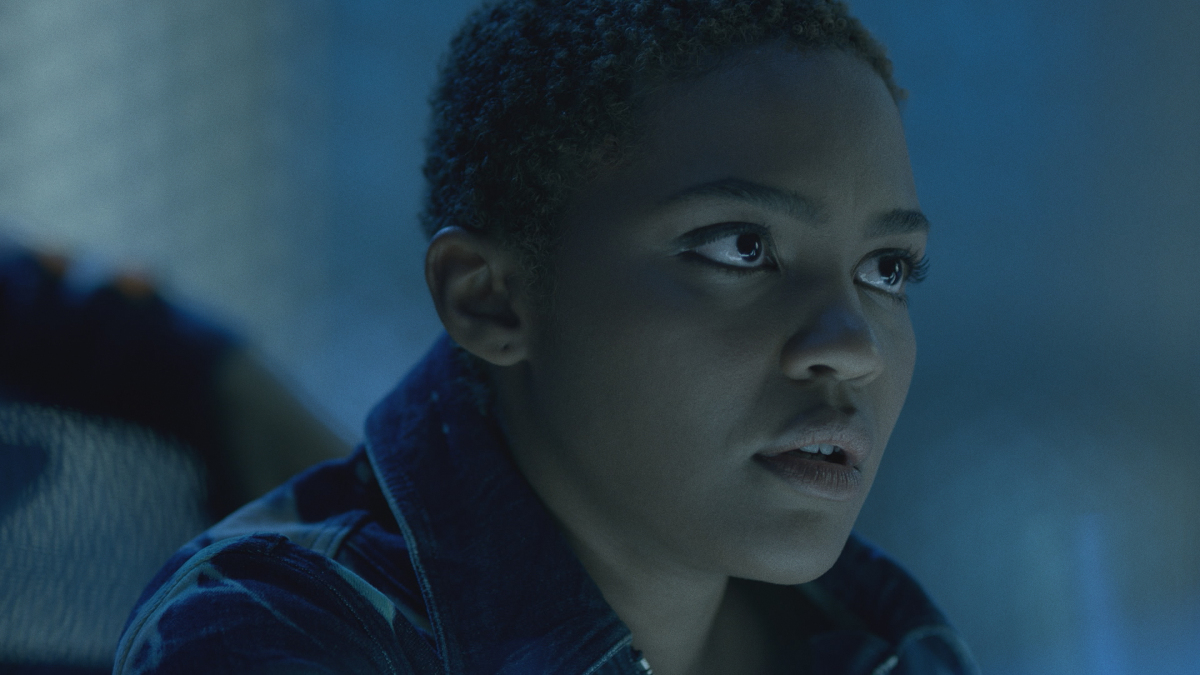This Black Lightning review contains major spoilers for Season 4.
Jennifer Pierce flew into the ionosphere and absorbed so much energy, she exploded. This is how “The Book of Reconstruction: Chapter Four” ends, with particles that used to be Jen dispersing into space. For one week we sat with the possibility that Jen could be dead. And with China Anne McClain having announced an early departure, it didn’t seem out of the realm of possibility that Jen wouldn’t return in any form. But, in “The Book of Ruin: Chapter One,” Jefferson is able to absorb the particles that make up Jennifer’s essence and put them into a hadron particle condenser. And after days, the machine 3D prints Jennifer, who survives the entire ordeal… Except she comes out of the machine different. She has an entirely new appearance and is now portrayed by newcomer Laura Kariuki.
It would’ve been all too easy for Black Lightning to let Jennifer Pierce die. Death is an inevitability in narratives that center powered people and even more so when those people are at odds with each other. And this being the last season of Black Lightning means that no one is off limits as a potential character death. The writers could’ve taken Jennifer off the board, destabilizing Jefferson and Lynn even further. They could’ve fridged Jen, and used her death as a way to motivate Jefferson… Or Khalil. But death is an easy way to introduce conflict, and though there is narrative value in exploring the resulting grief, the choice to keep Jennifer in the story is one of my favorites of the entire series.
Black Lightning is a superhero show that deals very heavily in real-world politics and depicts violence against Black characters that mirrors the real-life violence against Black people. Because it so accurately reflects the reality of anti-Blackness and systemic racism, it is not always an easy or comfortable viewing experience. Watching characters we love get profiled and harassed by law enforcement can hit too close to home, and those feelings are only amplified when these characters are put up against people and organizations that don’t value their lives at all. Triumphs for Black Lightning are more than wins for the show’s hero, but often, they are wins for the majority-Black population of Freeland—and by proxy, wins for all those who find a sense of familiarity with the fictional city.
The opposite of that is also true. Death and destruction is par for the course in superhero fare, but when your heroes are also marginalized in multiple instersecting ways — queer, Black, meta, etc.— visiting those things upon them takes on an extra layer of meaning. Killing Jennifer would inflict additional trauma on an audience who is still absorbed in Jefferson’s grief over the loss of Henderson and the collective grief of the people of Freeland. We watched a Black boy succumb to gunshot wounds, and saw his father mourn. In short, Black Lightning has hurt us enough.
Killing characters is one way to write around actors leaving but leaning into the comic book absurdity of the source material was the right answer here. The choice to recast Jennifer instead of killing her is relieving. Not only does it spare us having to grieve the loss of the youngest Pierce, but it opens up a lot of exciting plot possibilities. Jennifer will likely struggle with a loss of identity and possibly even a loss or change in abilities. Either of these would challenge how she sees herself, but both together could be a very powerful examination of identity and power, and allow for deeply engaging character movement. Also having a new appearance creates opportunities for Lightning to operate in plain sight, with a look far enough removed from her original that people won’t associate the two. Changing faces is the kind of comic book shenanigans we should see more of in Black Lightning and anything that plays with the fantastical is a welcome break from the realism.
